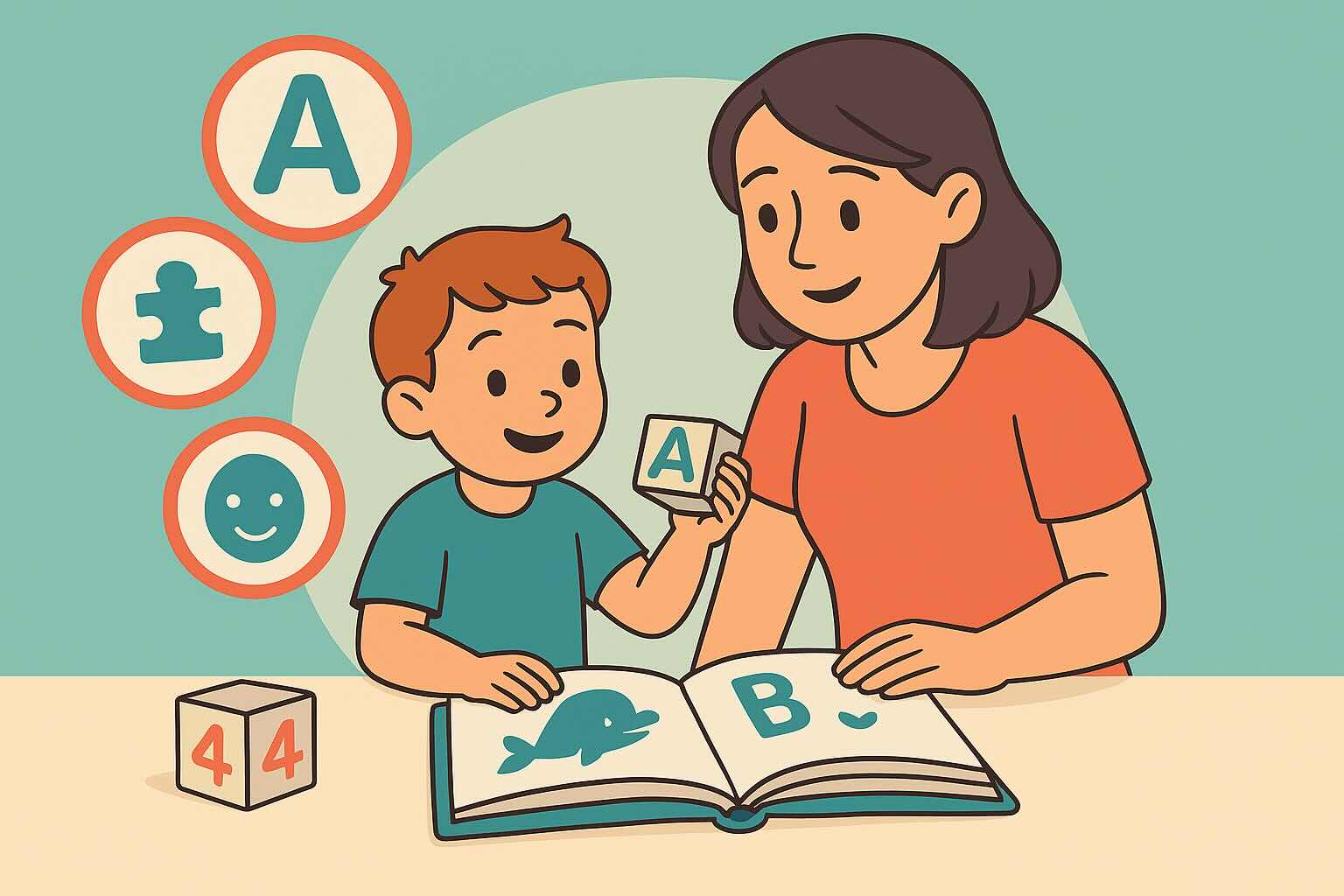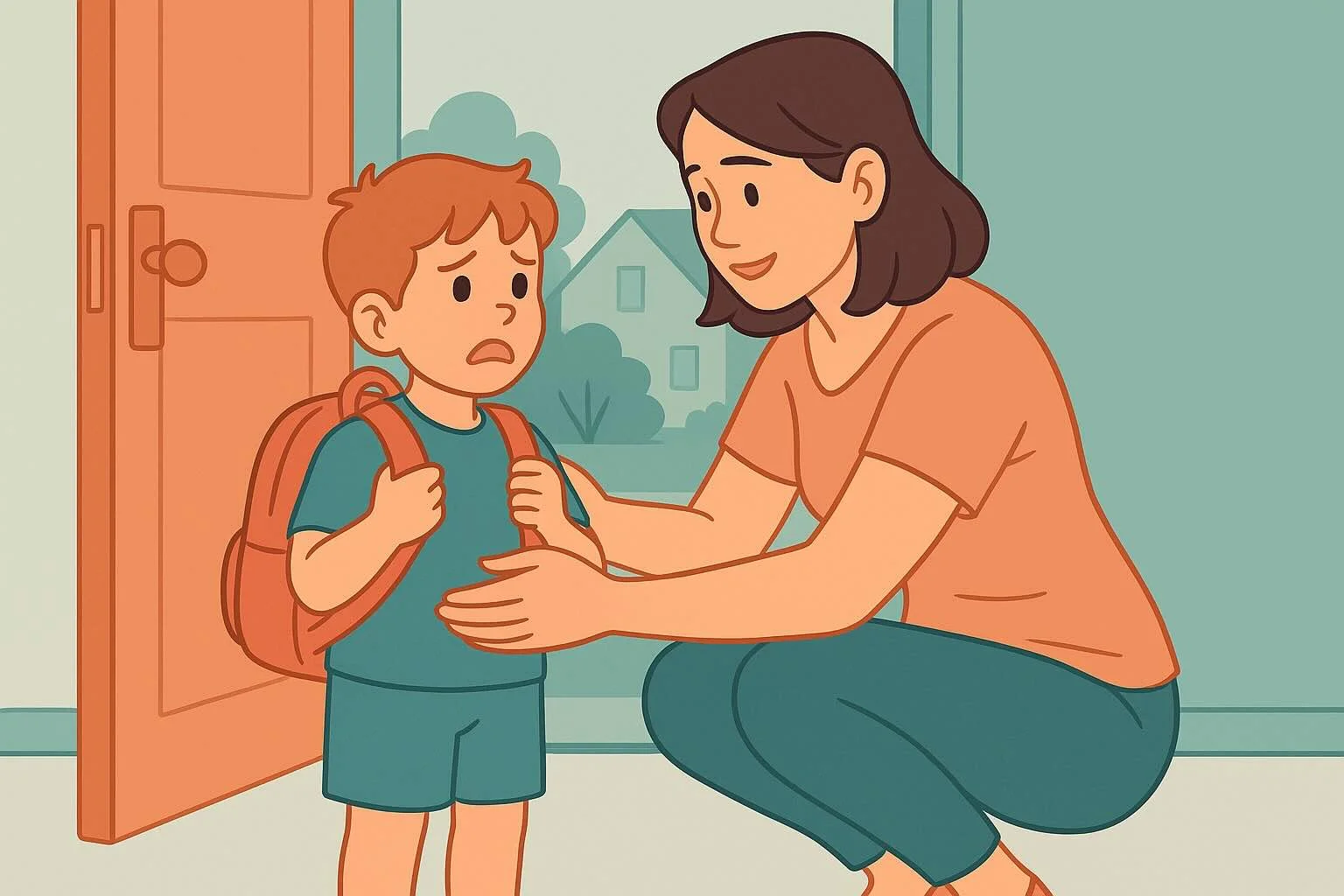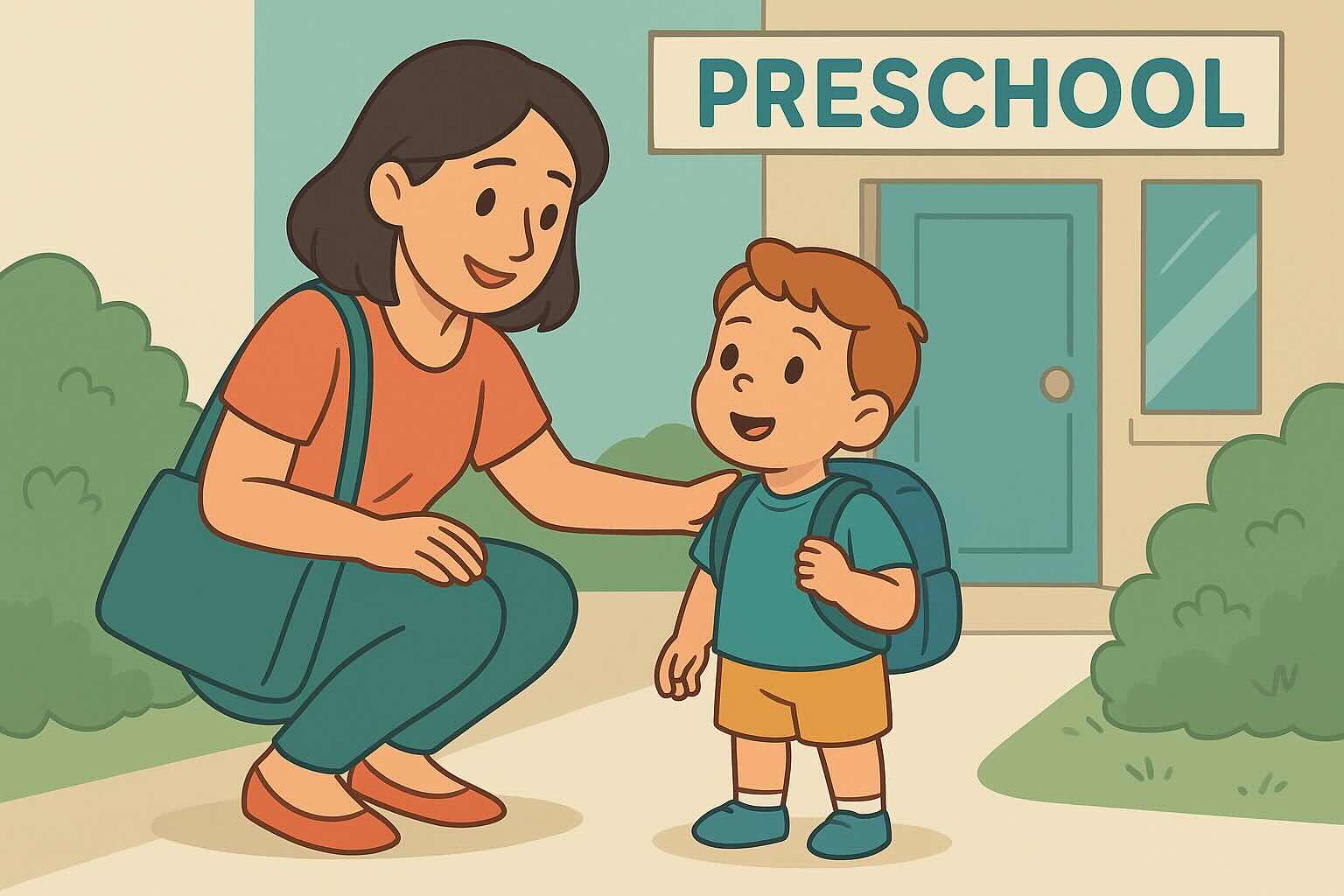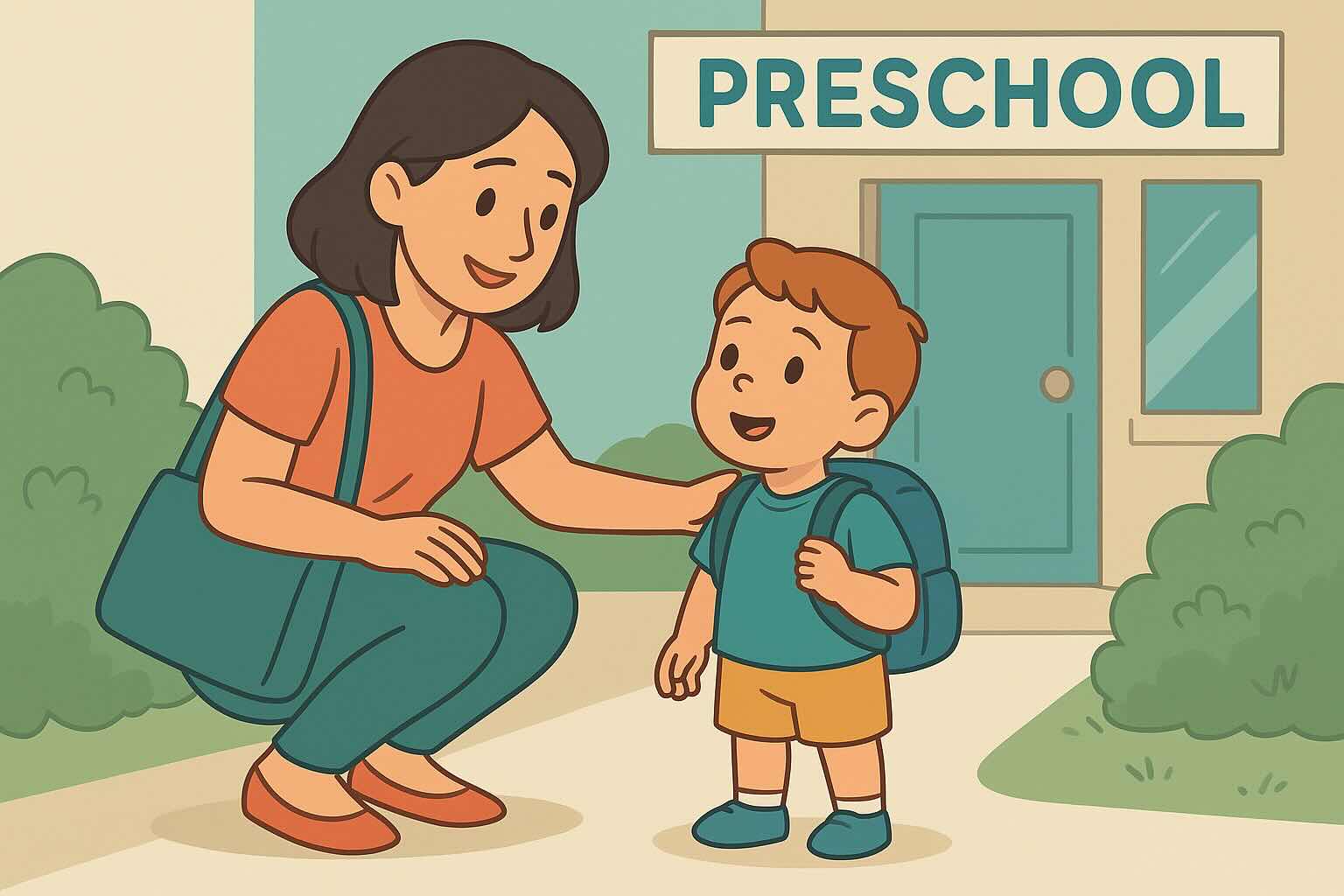Preparing Your 4-Year-Old for Preschool: Essential Skills


Preparing your 4-year-old for preschool is an exciting opportunity to build confidence, independence, and learning enthusiasm before they take this important developmental step. Research shows that children who receive thoughtful preparation for preschool demonstrate better adjustment, stronger peer relationships, and greater academic engagement compared to those who start without preparation.
At 4, your child is at an ideal age for preschool preparation. They have the cognitive ability to understand explanations about school, the language skills to express their needs and feelings, and the physical development for increased independence. However, they still need significant support for emotional regulation, social skills, and building confidence in new environments.
This comprehensive guide provides evidence-based strategies to prepare your 4-year-old for preschool success across all developmental domains. You'll discover practical activities, timeline strategies, and confidence-building approaches that make this transition smooth and positive for your entire family.
For additional transition support, explore our guides on starting preschool at 4, preparing for kindergarten, managing routine changes, and building cooperation skills.
What You'll Learn in This Guide
- Comprehensive Readiness Assessment - Evaluating your child's current skills and areas for growth
- Essential Life Skills Development - Building independence in self-care, communication, and problem-solving
- Social-Emotional Preparation - Developing cooperation, empathy, and emotional regulation abilities
- Academic Readiness Without Pressure - Building foundation skills through play and exploration
- 12-Week Preparation Timeline - Structured approach with specific milestones and activities
- Confidence Building Strategies - Helping your child feel excited and capable about starting preschool
- Family Preparation - Getting the whole family ready for this important transition
Estimated reading time: 12 minutes
Understanding Your 4-Year-Old's Readiness Profile
Developmental Strengths of 4-Year-Olds
4-year-olds bring unique advantages to the preschool experience that younger children don't possess. Understanding these strengths helps you build on your child's natural capabilities while addressing areas that still need development.
Cognitive advances that support preschool success:
- Enhanced memory allows them to remember multi-step instructions and classroom routines
- Improved attention span enables participation in 15-20 minute structured activities
- Language sophistication supports communication with teachers and peers
- Beginning logical thinking helps them understand cause-and-effect relationships
- Curiosity and questioning drives engagement with learning activities
Social-emotional development in progress:
- Friendship interest motivates cooperation and social skill development
- Empathy emergence helps them understand others' perspectives and feelings
- Independence desire motivates mastery of self-care and problem-solving skills
- Rule understanding supports following classroom expectations and routines
- Emotional expression becomes more sophisticated but regulation still needs support
Assessing Your Child's Current Readiness
Independence and self-care abilities:
- Bathroom use including wiping, handwashing, and clothing management
- Eating meals and snacks with minimal adult assistance
- Dressing and undressing with appropriate seasonal clothing
- Managing personal belongings and following simple organizational systems
- Asking for help when genuinely needed rather than defaulting to dependence
Communication and social skills:
- Expressing needs, feelings, and preferences clearly with words
- Listening to others and responding appropriately in conversations
- Sharing materials and taking turns, even when difficult
- Showing interest in other children and attempting social interaction
- Following group instructions and participating in community activities
Emotional regulation and coping:
- Calming down within reasonable time when upset (10-20 minutes with support)
- Expressing frustration with words rather than physical aggression
- Accepting comfort from adults other than parents when distressed
- Showing resilience when activities don't go as planned
- Demonstrating persistence when tasks become challenging
Essential Life Skills Development
Building Independence in Daily Tasks
Independence skills form the foundation of preschool success, allowing your child to focus on learning and social interaction rather than basic survival needs. 4-year-olds can develop sophisticated self-care abilities with practice and encouragement.
Bathroom independence mastery:
- Complete toilet routine including undressing, wiping, dressing, and handwashing
- Recognizing body signals and requesting bathroom breaks appropriately
- Managing different types of clothing fasteners (buttons, snaps, zippers)
- Using toilet paper appropriately and flushing consistently
- Maintaining privacy and following bathroom etiquette expectations
Mealtime independence skills:
- Opening various containers, packages, and lunch items without assistance
- Using utensils appropriately and eating within reasonable time limits
- Cleaning up spills and managing food waste appropriately
- Making simple food choices when options are provided
- Following mealtime social expectations like conversation and table manners
Self-care and organization:
- Dressing and undressing including shoes, socks, and seasonal outerwear
- Managing personal belongings in cubbies, backpacks, and designated spaces
- Following morning and end-of-day routines with minimal adult supervision
- Maintaining personal hygiene including handwashing, face wiping, and nose blowing
- Taking responsibility for special items like comfort objects or medications
Practice strategies for building independence:
- Allow extra time for your child to complete tasks without rushing or rescuing
- Break complex tasks into smaller steps and celebrate progress at each stage
- Create opportunities for practice in low-pressure, supportive environments
- Provide appropriate tools and materials that are sized for small hands
- Encourage problem-solving attempts before offering assistance
Communication and Help-Seeking Skills
4-year-olds can develop sophisticated communication abilities that serve them well in group learning environments. These skills help them get their needs met while building positive relationships with teachers and peers.
Essential communication abilities:
- Asking for help with specific problems rather than general complaints
- Expressing feelings and needs clearly enough for adults to understand and respond
- Making requests politely using appropriate social language
- Engaging in back-and-forth conversations with adults and children
- Asking questions when confused or curious about activities or expectations
Self-advocacy development:
- Identifying when they need assistance versus when they can solve problems independently
- Communicating preferences and making choices when appropriate options are offered
- Expressing discomfort or concerns about safety, social situations, or academic challenges
- Reporting conflicts or problems to adults when peer resolution attempts aren't successful
- Requesting modifications or support when tasks feel overwhelming or too difficult
Building communication skills:
- Practice conversations during daily routines and encourage elaborate responses
- Role-play different scenarios where your child needs to communicate with unfamiliar adults
- Encourage your child to place orders at restaurants or ask questions in community settings
- Discuss appropriate times to interrupt adults and how to wait for attention
- Model clear, respectful communication in your own interactions with others
Social-Emotional Preparation for Group Success
Developing Cooperation and Sharing Skills
4-year-olds are naturally more interested in social interaction than younger children, but they still need explicit teaching and practice to navigate group dynamics successfully. Cooperation skills are essential for preschool activities and peer relationships.
Essential cooperation abilities:
- Sharing materials, toys, and adult attention willingly (even if not always happily)
- Taking turns in games, conversations, and activities without constant adult mediation
- Contributing to group projects and activities rather than working entirely independently
- Following group rules and expectations even when they differ from home rules
- Showing flexibility when plans change or activities don't meet their preferences
Conflict resolution and problem-solving:
- Using words to express disagreement or frustration with peers
- Attempting simple problem-solving before asking adults for help
- Accepting compromises and alternative solutions when their first choice isn't possible
- Showing empathy when others are upset or hurt by their actions
- Learning from social mistakes and adjusting behavior in future similar situations
Practice opportunities for social skill development:
- Arrange regular group playdates with 2-3 children to practice sharing and cooperation
- Create family activities that require teamwork and shared resources
- Practice turn-taking games and activities that have clear rules and expectations
- Discuss social situations that arise and brainstorm better responses for future situations
- Model cooperative behavior and thinking aloud about social problem-solving
Emotional Regulation and Coping Strategies
Preschool environments can be emotionally challenging for 4-year-olds due to increased social complexity, higher expectations, and less individual adult attention. Building emotional regulation skills prepares your child to handle these challenges successfully.
Age-appropriate emotional regulation abilities:
- Recognizing body signals that indicate rising emotions (tight muscles, fast heartbeat, hot face)
- Using simple calming strategies independently when feeling overwhelmed
- Expressing big emotions in ways that don't hurt others or disrupt group activities
- Accepting comfort and support from teachers and other adults when parents aren't available
- Recovering from disappointments or setbacks within a reasonable timeframe
Coping strategies for 4-year-olds:
- Deep breathing techniques: "Smell the flower, blow out the candle"
- Physical calming: gentle stretching, quiet movement, or requested space
- Emotional expression: drawing pictures, using feeling words, or talking to trusted adults
- Problem-solving focus: "What could I do differently next time?"
- Self-comfort: positive self-talk, remembering successful experiences, or using comfort objects
Building emotional regulation at home:
- Practice calming strategies during non-stressful times so they're available during difficult moments
- Help your child identify and name specific emotions with expanded feeling vocabulary
- Model your own emotional regulation and discuss your coping strategies openly
- Create a designated calm-down space where your child can go when feeling overwhelmed
- Read books about emotions and discuss characters' feelings and problem-solving strategies
Academic Readiness Through Play and Exploration
Pre-Literacy Skills Development
While 4-year-olds don't need to read before starting preschool, certain foundation skills support their success in literacy-rich classroom environments. Focus on building enthusiasm for books and understanding that print carries meaning.
Essential pre-literacy abilities:
- Name recognition and beginning letter awareness, especially letters in their own name
- Understanding book concepts: front/back, left-to-right reading, pictures and words
- Phonological awareness: rhyming, alliteration, and beginning sound recognition
- Story comprehension and vocabulary development through rich book experiences
- Fine motor skills that support eventual writing: drawing, cutting, and tracing
Pre-numeracy foundation skills:
- Number recognition 1-10 and beginning counting with one-to-one correspondence
- Shape recognition and geometric thinking in everyday environments
- Pattern recognition and creation with various materials and situations
- Size and spatial relationship understanding: bigger/smaller, inside/outside, before/after
- Beginning measurement and comparison concepts through hands-on exploration
Natural academic skill building:
- Read together daily and discuss stories, characters, predictions, and connections to your child's life
- Point out letters, numbers, and words in environmental print during everyday activities
- Provide opportunities for drawing, painting, cutting, and other fine motor skill development
- Engage in cooking, building, and sorting activities that develop mathematical thinking naturally
- Follow your child's interests and expand learning through hands-on exploration and discovery
Building Learning Enthusiasm and Curiosity
Creating positive learning associations:
- Follow your child's natural interests and build on their curiosity about the world
- Provide rich experiences that expand vocabulary and background knowledge through field trips and exploration
- Celebrate effort, creativity, and problem-solving rather than correctness or achievement
- Make learning playful and hands-on rather than worksheet-based or overly structured
- Model your own learning, curiosity, and excitement about discovering new information
Avoiding academic pressure:
- Focus on building confidence and love of learning over specific skill achievement
- Don't push formal academic instruction if your child shows resistance or stress
- Avoid comparing your child's academic development to peers or siblings
- Trust that quality preschool programs will build on your child's natural development
- Remember that readiness varies widely and develops according to individual timelines
12-Week Preschool Preparation Timeline
Weeks 12-9: Foundation Assessment and Planning
Evaluate your child's current abilities:
- Complete a comprehensive assessment of independence skills, social abilities, emotional regulation, and academic interests
- Identify specific areas for growth and development over the coming months
- Gather information about your chosen preschool program including daily schedule, expectations, and philosophy
- Begin positive conversations about preschool without creating pressure or anxiety
Begin foundational skill building:
- Start working on basic independence skills that need development
- Increase opportunities for social interaction and group activities
- Begin introducing preschool-related books and conversations into daily routines
- Address any concerns about your child's development with your pediatrician or early childhood specialists
Weeks 8-5: Intensive Skill Development
Focus on essential readiness skills:
- Intensify independence skill development with daily practice and encouragement
- Provide regular opportunities for social skill practice through playdates and group activities
- Begin emotional regulation skill teaching and practice during everyday challenging moments
- Introduce academic readiness activities naturally through play and exploration
Environmental preparation:
- Visit the preschool building and playground if possible during off-hours
- Drive or walk the route you'll take to school to build familiarity
- Begin adjusting daily routines to more closely match the preschool schedule
- Start building positive associations with school through books, conversations, and excitement
Weeks 4-1: Integration and Final Preparation
Integrate all readiness skills:
- Practice complete daily routines that mirror preschool expectations
- Combine independence, social, emotional, and academic skills in structured activities
- Address any remaining concerns or anxiety your child expresses about starting preschool
- Meet with teachers during orientation or home visits to discuss your child's individual needs
Final practical preparations:
- Complete supply shopping and organization with your child's participation and excitement
- Practice the complete morning routine including travel time and arrival at school
- Plan meaningful first-day traditions or celebrations to honor this developmental milestone
- Ensure all paperwork, medical requirements, and emergency contact information is complete and submitted
Week 0: Starting Preschool with Confidence
Support successful adjustment:
- Maintain consistent routines and expectations while allowing for emotional adjustment
- Communicate regularly with teachers about your child's daily experiences and any concerns
- Celebrate your child's courage and independence while providing emotional support for challenges
- Trust the adjustment process while monitoring your child's overall wellbeing and happiness
Confidence Building Strategies
Creating Positive Anticipation
Building excitement about preschool:
- Share your own positive memories and feelings about school experiences
- Focus on exciting aspects: making friends, trying new activities, learning interesting things
- Avoid creating unrealistic expectations while maintaining genuine enthusiasm
- Connect preschool preparation to your child's current interests and favorite activities
Addressing worries and fears:
- Listen to your child's concerns without dismissing or minimizing their feelings
- Provide age-appropriate information about what preschool will actually be like
- Problem-solve together about specific worries or challenges your child anticipates
- Share confidence in your child's ability to handle new experiences and challenges
Building Mastery and Self-Efficacy
Creating success opportunities:
- Provide appropriately challenging activities that your child can master with effort
- Celebrate persistence and problem-solving rather than natural ability or easy tasks
- Break larger goals into smaller, manageable steps that build on each other
- Allow your child to struggle briefly with challenges before offering assistance
Developing growth mindset:
- Use language that emphasizes learning and improvement over fixed abilities
- Normalize mistakes as important parts of the learning process
- Model your own learning challenges and growth in front of your child
- Focus on effort and strategy development rather than natural talent or intelligence
Family Preparation for Preschool Transition
Preparing Siblings and Family Members
Supporting siblings during the transition:
- Include siblings in preschool preparation activities when appropriate
- Address any concerns older or younger siblings have about family changes
- Maintain special individual time with siblings who may feel displaced by preschool preparation focus
- Discuss how family routines and schedules will change when preschool begins
Extended family and caregiver preparation:
- Share preschool preparation strategies with grandparents, babysitters, and other regular caregivers
- Ensure consistent expectations and approaches across different care environments
- Communicate about your child's preschool experience and how others can support adjustment
- Include extended family members in celebrating this important developmental milestone
Parental Emotional Preparation
Managing your own feelings about the transition:
- Acknowledge any anxiety, sadness, or excitement you feel about your child starting preschool
- Seek support from other parents who have navigated this transition successfully
- Focus on the growth opportunities preschool provides for your child's development
- Trust your child's resilience and ability to adapt to new environments with appropriate support
Maintaining perspective and realistic expectations:
- Remember that adjustment takes time and temporary setbacks are normal parts of the process
- Avoid comparing your child's experience to other children's preschool transitions
- Focus on your individual child's growth and development rather than external measures of success
- Celebrate small victories and progress milestones throughout the preparation and adjustment process
Your 4-Week Final Preparation Checklist
Week 1: Skills Integration and Confidence Building
- Complete final assessment of readiness skills and celebrate progress made
- Practice integrated daily routines that combine independence, social, and emotional skills
- Address any remaining concerns or anxiety your child expresses about starting preschool
- Build excitement and positive anticipation through books, conversations, and preparation activities
Week 2: Environmental Familiarity and Teacher Connection
- Visit preschool environment and meet teachers during scheduled orientation
- Practice morning routine including timing and transportation to school
- Discuss your child's individual needs, interests, and effective strategies with teachers
- Complete any remaining paperwork, supply purchasing, and logistical arrangements
Week 3: Routine Implementation and Final Skills Practice
- Implement complete preschool-schedule routines including wake-up, meals, and bedtime timing
- Provide final intensive practice for any skills that still need development
- Plan meaningful first-day traditions or celebrations to mark this important milestone
- Prepare emotionally supportive strategies for the first weeks of adjustment
Week 4: Celebration and Launch
- Focus on celebrating your child's growth and readiness rather than perfection
- Maintain calm confidence and excitement about the adventure ahead
- Trust your child's ability to adapt and thrive with appropriate support and time
- Begin preschool with realistic expectations and patience for the adjustment process
Key Takeaways: Preparing Your 4-Year-Old for Preschool Success
- ✅ Start preparation 2-3 months before preschool to allow gradual skill building without anxiety
- ✅ Independence skills are most crucial for initial preschool adjustment and success
- ✅ Social-emotional abilities predict long-term success more than early academic skills
- ✅ Individual readiness varies widely - focus on your child's unique development rather than comparisons
- ✅ Practice and repetition build confidence - skills develop through consistent encouragement and opportunity
- ✅ Family preparation supports smooth transition for everyone involved in this milestone
- ✅ Academic readiness develops naturally through play and exploration rather than formal instruction
- ✅ Emotional regulation requires explicit teaching and practice in supportive environments
- ✅ Positive associations with learning are more important than specific skill achievement
- ✅ Professional support is available if your child needs additional time or different approaches
Remember: Preschool preparation is about building your child's confidence, independence, and enthusiasm for learning. Trust their individual development timeline while providing the support, practice opportunities, and encouragement they need to thrive in their new environment.
This article is based on early childhood development research and educational psychology. Individual experiences vary based on child temperament, family circumstances, and program quality. Consult with teachers, school counselors, or your pediatrician if you have concerns about your child's preschool readiness or adjustment.
24/7 AI Parenting Assistant
Get instant, personalized advice with expert-curated parenting knowledge. Chat with your AI coach anytime, anywhere.

Self-Care for Parents
Daily affirmations, guided meditations, and journaling tools to help you stay centered and emotionally balanced.

Routine Transition Planner
4-week method for implementing routine changes successfully with gradual strategies and resistance management techniques.
Frequently Asked Questions
Need personalized support?
RootWise's AI coach can provide tailored strategies for your specific situation, available 24/7 when you need it most.
Learn More About AI Coaching →



